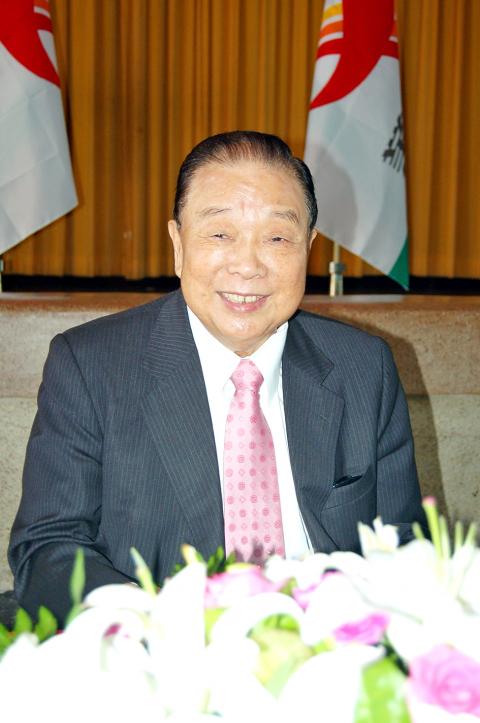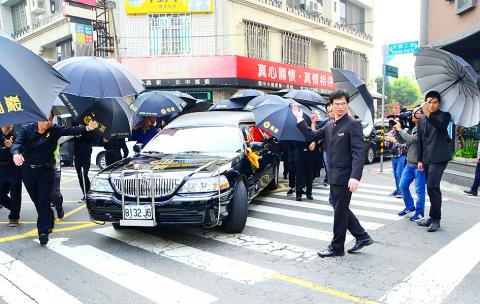Uni-President Enterprises Corp (UPE, 統一企業) yesterday confirmed that founder and honorary chairman Kao Ching-yuan (高清愿) died last week at the age of 88.
A private funeral was held in Tainan’s Yongkang District (永康) yesterday, attended only by Kao’s family and friends, as well as Uni-President employees.
Born in Tainan on May 24, 1929, Kao was from a poor family and was not formally educated beyond elementary school. He founded UPE in 1967 and served as its chairman until 2013.

Photo: Yang Ya-min, Taipei Times
The company grew to become a conglomerate encompassing food manufacturing, retail, leisure and express-delivery services. It also operates the Starbucks coffee chain in Taiwan via a joint venture with the Seattle-based group.
The conglomerate is also known for operating 7-Eleven, the nation’s largest convenience store chain, through its affiliate President Chain Store Corp (PCSC, 統一超商).
Kao launched the convenience store chain in the 1980s, aiming to expand retail channels available for UPE products.

Photo: Wu Chun-feng, Taipei Times
UPE’s footprint expanded in the 1990s, with manufacturing bases set up in China, Indonesia, Thailand and other countries.
Kao, who had only one child, handed over the business to his son-in-law, Alex Lo (羅智先), in November 2013. Since then, the company has continued to grow under Lo’s leadership, weathering a series of food-safety crises in Taiwan while expanding its presence in China.
Lo’s management style and strategy of focusing on improving margins over sales growth has been well received by the market, with foreign institutional investors raising their holdings in UPE from about 44 percent to 52 percent in the past decade.
However, a potential succession challenge is on the horizon, as Lo had established a rule stipulating that key executives must retire at the age of 60 to make way for new talent.
Lo’s 60th birthday is this year.
Lo is expected to conform to the rule he has set, but major stakeholders in the company are likely to try to convince him to stay to avoid disruptions in leadership, industry observers said.
In addition, the company’s triennial board elections are to take place this year.
UPE’s net income rose 26.8 percent annually to NT$14.11 billion (US$435.79 million) last year, with earnings per share (EPS) of NT$2.48. Consolidated sales dipped 0.5 percent year-on-year to NT$416.15 billion.
PCSC’s net income decreased 9.8 percent to NT$8.24 billion last year, with EPS of NT$7.92, while consolidated sales grew 2.52 percent to NT$205.5 billion.
Despite a tepid consumption environment, UPE is expected to see continued solid growth and market share gains in all segments, driven by new product launches and contributions from its Chinese subsidiary, Uni-President China Holdings Ltd (UPC, 統一中國控股), Yuanta Securities Investment Consulting Co (元大投顧) said in a note this week.
Uni-President China last year saw net income rise 192 percent annually to 835 million yuan (US$129.18 million) as it continued its high-end product focus, coupled with a strong pipeline of new products, Yuanta said.

CHAOS: Iranians took to the streets playing celebratory music after reports of Khamenei’s death on Saturday, while mourners also gathered in Tehran yesterday Iranian Supreme Leader Ayatollah Ali Khamenei was killed in a major attack on Iran launched by Israel and the US, throwing the future of the Islamic republic into doubt and raising the risk of regional instability. Iranian state television and the state-run IRNA news agency announced the 86-year-old’s death early yesterday. US President Donald Trump said it gave Iranians their “greatest chance” to “take back” their country. The announcements came after a joint US and Israeli aerial bombardment that targeted Iranian military and governmental sites. Trump said the “heavy and pinpoint bombing” would continue through the week or as long

TRUST: The KMT said it respected the US’ timing and considerations, and hoped it would continue to honor its commitments to helping Taiwan bolster its defenses and deterrence US President Donald Trump is delaying a multibillion-dollar arms sale to Taiwan to ensure his visit to Beijing is successful, a New York Times report said. The weapons sales package has stalled in the US Department of State, the report said, citing US officials it did not identify. The White House has told agencies not to push forward ahead of Trump’s meeting with Chinese President Xi Jinping (習近平), it said. The two last month held a phone call to discuss trade and geopolitical flashpoints ahead of the summit. Xi raised the Taiwan issue and urged the US to handle arms sales to

BIG SPENDERS: Foreign investors bought the most Taiwan equities since 2005, signaling confidence that an AI boom would continue to benefit chipmakers Taiwan Semiconductor Manufacturing Co’s (TSMC, 台積電) market capitalization swelled to US$2 trillion for the first time following a 4.25 percent rally in its American depositary receipts (ADR) overnight, putting the world’s biggest contract chipmaker sixth on the list of the world’s biggest companies by market capitalization, just behind Amazon.com Inc. The site CompaniesMarketcap.com ranked TSMC ahead of Saudi Aramco and Meta Platforms Inc. The Taiwanese company’s ADRs on Tuesday surged to US$385.75 on the New York Stock Exchange, as strong demand for artificial intelligence (AI) applications led to chip supply constraints and boost revenue growth to record-breaking levels. Each TSMC ADR represents

State-run CPC Corp, Taiwan (CPC, 台灣中油) yesterday said that it had confirmed on Saturday night with its liquefied natural gas (LNG) and crude oil suppliers that shipments are proceeding as scheduled and that domestic supplies remain unaffected. The CPC yesterday announced the gasoline and diesel prices will rise by NT$0.2 and NT$0.4 per liter, respectively, starting Monday, citing Middle East tensions and blizzards in the eastern United States. CPC also iterated it has been reducing the proportion of crude oil imports from the Middle East and diversifying its supply sources in the past few years in response to geopolitical risks, expanding